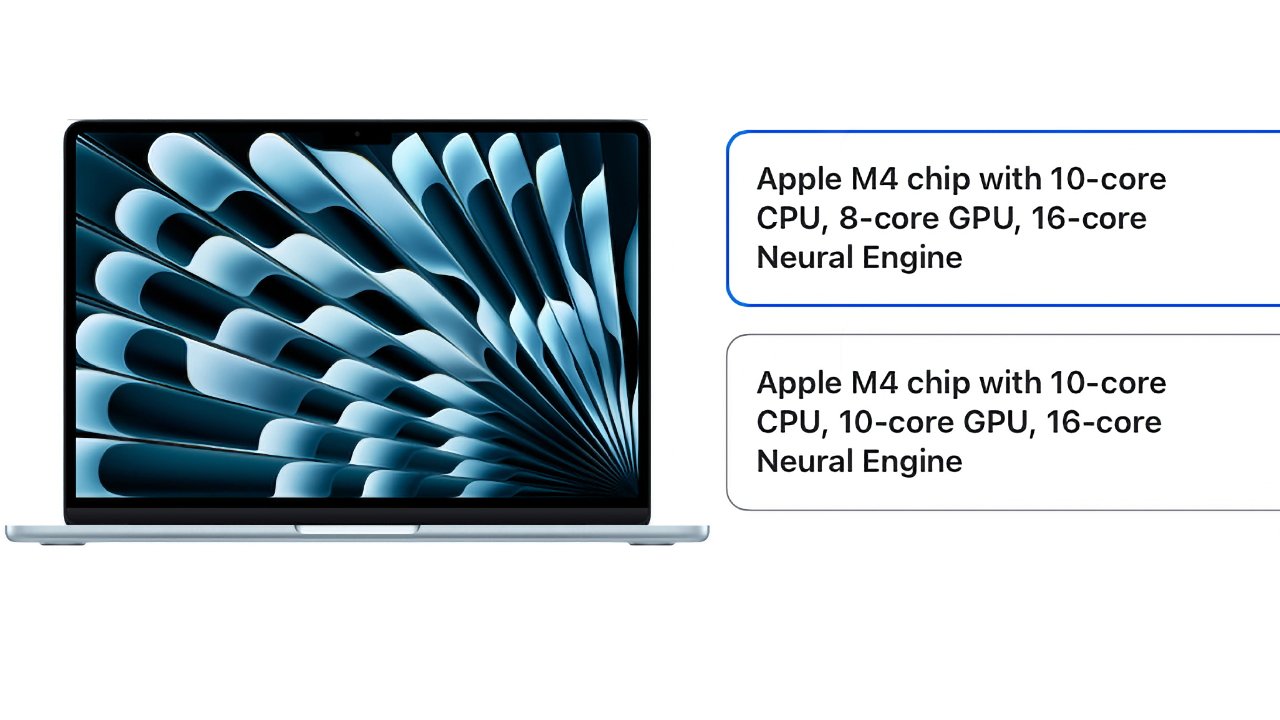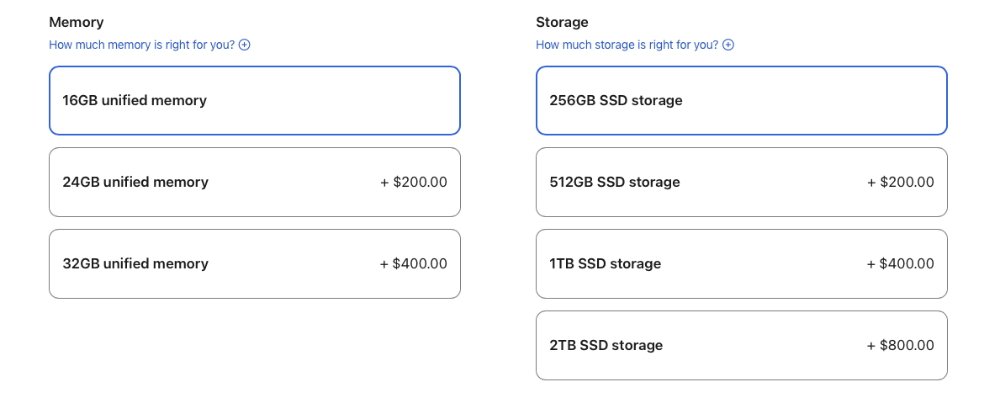Apple's extortionate upgrade prices can't stop the MacBook Air being a bargain
Apple will never sell a cheap upgrade to anything, but choices the firm has made about the MacBook Air mean even it can't wring all that much more cash out of buyers.

Apple's Build to Order options for the MacBook Air start with a minor processor difference
Apple would never say this publicly, but so often you know it has released a version of a device solely to hit a price point. It wants to be able to say you can get a MacBook Air for under a thousand bucks, for instance, so it makes that more or less true.
Usually less. Usually the configuration you get for the lowest price of any Apple device is at the very best just about adequate, and usually not even that.
Think of how the 10th generation iPad started at 64GB for years -- until the latest version bumped that up to 128GB. Or think of how even when Apple would sell you a Mac Pro for tens of thousands of dollars, it still tried to get 700 bucks out of you for some wheels.
The cachet is in hitting a price point, but the money is in making you upgrade at Apple's ludicrously expensive rates.
It's not as if the new MacBook Air is a complete exception to this, but the configuration that comes in at $999 is fully usable. And, most unusually, the absolute maximum you can make Apple take from you for a MacBook Air is not as high as you'd expect.
Specifically, if you had absolutely every top of the range update available for the 13-inch MacBook Air -- including adding in Final Cut Pro and Logic Pro software -- you'd pay $2,698.98. For the 15-inch model, the maximum is $2,898.98.
Take out Final Cut Pro and Logic Pro, and the maximum hardware cost is $2,199 for the 13-inch model, and $2,399 for the 15-inch one.
What this all gets you
The reason is that there are few updates you can really make to the new M4 MacBook Air. Presumably that's because if you could make many more, you'd be stepping onto the MacBook Pro's territory.

There are few upgrade options for the MacBook Air
But whatever the reason, the most you can do with the MacBook Air's GPU is go from an 8-core version to a 10-core version. You practically have to hunt to find that 8-core GPU, though, and every configuration has a 10-core CPU.
Then there is also a ceiling on the RAM upgrade you can make. The base models come with 16GB and can be upgrade to either 24GB or 32GB, but no further.
That's actually the same as the 14-inch MacBook Pro, but the 16-inch MacBook Pro can go up to 128GB RAM if you need it and if you can stomach the $1,000 extra cost.
Similarly, the 16-inch MacBook Pro can go up to 8TB of internal SSD storage if you're willing to pay $2,200. That's as much again as it costs to get a maxed-out 13-inch MacBook Air.
Whereas with that new MacBook Air, in either screen size and any configuration, the most internal storage you can get is 2TB. It'll set you back $600, but in Apple terms that's practically a bargain.
No nickle-and-diming you
It's easy to say that Apple overcharges for its upgrades, so let's. Apple overcharges for its upgrades compared to any other manufacturer.
But the suspicion that Apple has a spreadsheet that just rounds up the cost of its upgrades to the nearest national debt, is seemingly not true. Because for one thing, all configurations of the MacBook Air offer a choice of power adapter, and there's no price difference.
It's solely up to you whether you want a 35W Dual USB-C compact power adapter, or a 70W USB-C one that isn't so compact. Apple even gives you a guide to which you might want.
Now, the new Mac Studio, that's different. If you wanted to, you could take the base $1,999 version and take it up to $14,598.98.
You could trim that back by $499.98 and lose Final Cut Pro and Logic Pro, though. And you could elect to pay it instalments of a mere $1,216.58 per month for 12 months.
Read on AppleInsider

Comments
So my question for Mr. Gallagher is pretty simple: which base models of Apple devices have you bought or borrowed from Apple, then tested as your daily driver for a while and at what tasks did you find them "usually not even adequate?" Because there are actually a few online reviewers who make it a point to buy and use the base models of Apple devices, just to see how far they can be pushed, and I have yet to read of any base model that can't execute, without breaking a sweat, ANY task that a base model buyer might throw at it. That includes the usual suite of common business applications, as well as video/photo/audio editing, so long as the latter three are being done on a hobbyist basis and not professionally. It goes without saying that if your work (or personal passion) includes applications that are processor or memory intensive, then the base models aren't for you, nor were they ever intended to serve your needs. (In fact, maybe the Macbook Air, itself, isn't for you and a Pro would make more sense.) But there is a whole target market of buyers for which the base model makes perfect sense and is as much computer as they will ever actually need.
Are you comparing Apple's upgrade rates for M-Series RAM (on-die memory) to other platforms (eg, Intel) where the RAM is on separate packages/chips (eg, DDR5?) If so, that's not a fair comparison, because the performance isn't the same. On-die memory has lower latency, higher bandwidth, lower power consumption, reduced complexity and increased reliability. But if you don't value those things, then Apple RAM upgrades are expensive, yes.
I have increasingly been feeling that Apple under Tim Cook has forgotten this.
It's terribly unfortunate to see how my fellow Mac lovers enjoy beating on one another on the most trivial of matters. And then I scroll up and see that 3 people (so far) have taken an anonymous sledgehammer to poor DAalseth by hammering down on that horrid DISLIKE button. The DISLIKE button, of course, being yet another way to "troll" your fellow man. Absolutely terrible!
While I disagree PROFOUNDLY with ANYONE who seeks to tear down Tim Cook, including DAalseth in the above statement — Tim Cook being a man who has done an incredibly good job without the presence of Steve Jobs (and my AAPL shares prove that quite nicely) — I respect people who disagree with my sentiments. As such, I feel strongly that THERE IS NO NEED WHATSOEVER to click that slap-someone-in-their-face "Dislike" button, especially in cases like this. Even though I disagree with his feelings, I didn't click Dislike on his post. And there is certainly no good reason to label people who disagree with you as being trolls.
I clicked the link provided by williamlondon, which led me to the "Rules of the Troll [WIP]" page. Wow. Just wow. All I see is a humongous list of statements which irk some Mac fans, which most likely inspire those same Mac fans to seek out retribution on others by labeling them "trolls."
Rodney King was right to call for people to "just get along." And I call upon AppleInsider to start by removing the Dislike button. And at the same time, I call upon my fellow Mac fans to have a little forgiveness and brotherly love toward others. Anyone who has hate in their heart, feel free to click Dislike.
Apple charges what it does for upgrades because it can, not because it is more expensive to produce.
In terms of "skimping on products" under Cook, what would you cite as examples of that?
Almost every piece of hardware that I bought from Apple over the years last 6 to 9 years and has resale value try and find anything in the PC market that holds up that long software or hardware wise quality cost money, there are two cheaper avenues you can pursue…..
LG got 3/4 of the orders for the new M4 iPads, Samsung probably initially didn’t want to do it because they were not going to be able to sell double tandem OLED for a profit (small margins) on their own products into the PC/Android world.
DAalseth said: Yes, I was always concerned the supply chain master would focus on margins above all else, thus keeping products at the same basic iteration for much longer than Jobs would, and relying on his lieutenants to do the innovation, but always fitting into margins.
Yes, CharlesN, jobs did learn some hard lessons along the way, although I can clearly remember Apple fans incensed when John Scully engineered a coup. Aand how about this as a counterfactual to ponder: if Jobs had still been at the helm, instead of a corporate weenie, would Apple have been caught with its pants down with Windows 95?
Anyway, here is a more detailed quote of Jobs after he had learned his lesson, in a staff meeting with people upset with the cutting out of favourite projects to save Apple:.
Indeed. These days it would be more like “Not all our friends are Elon Musk.”